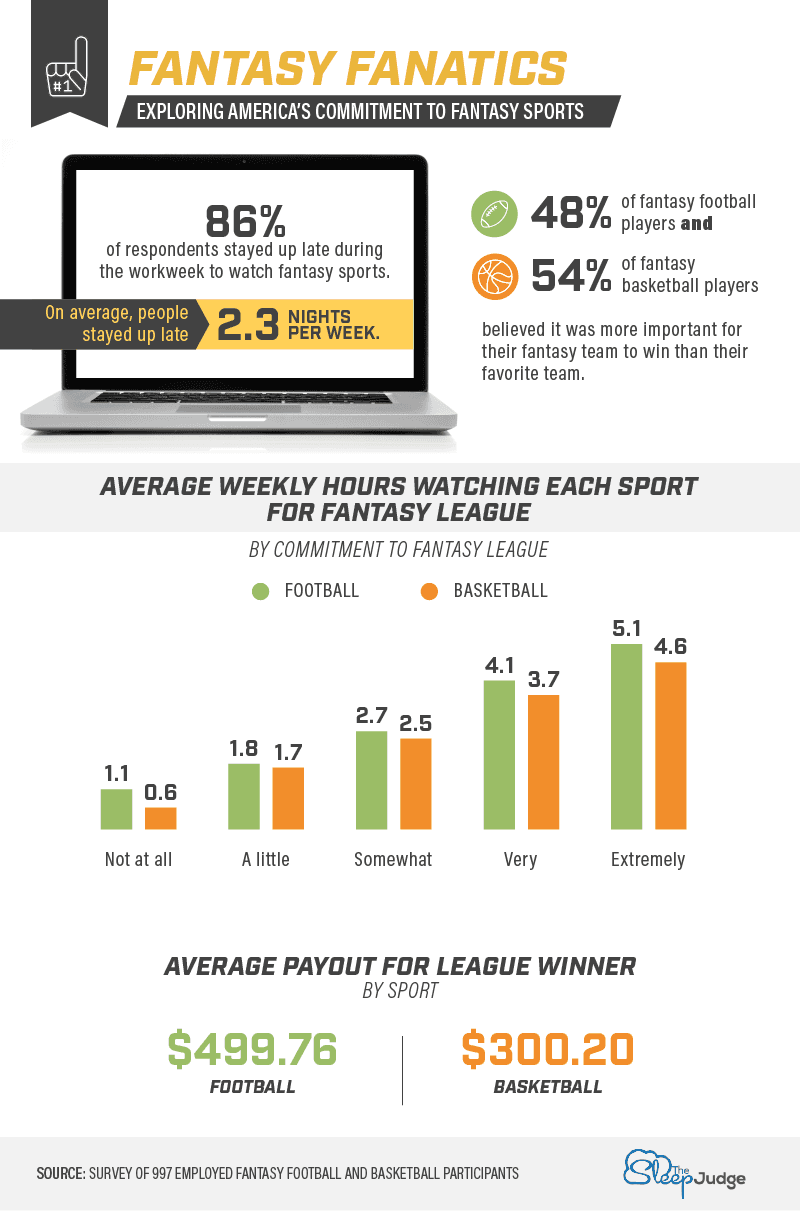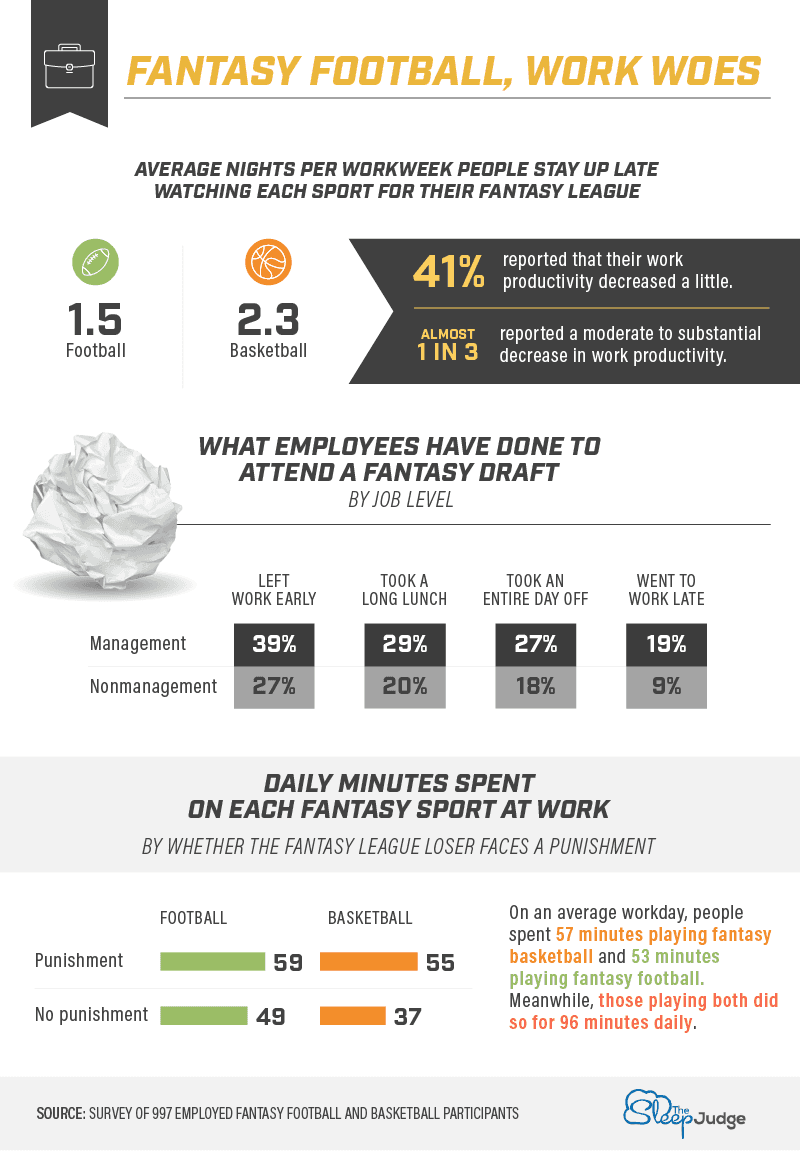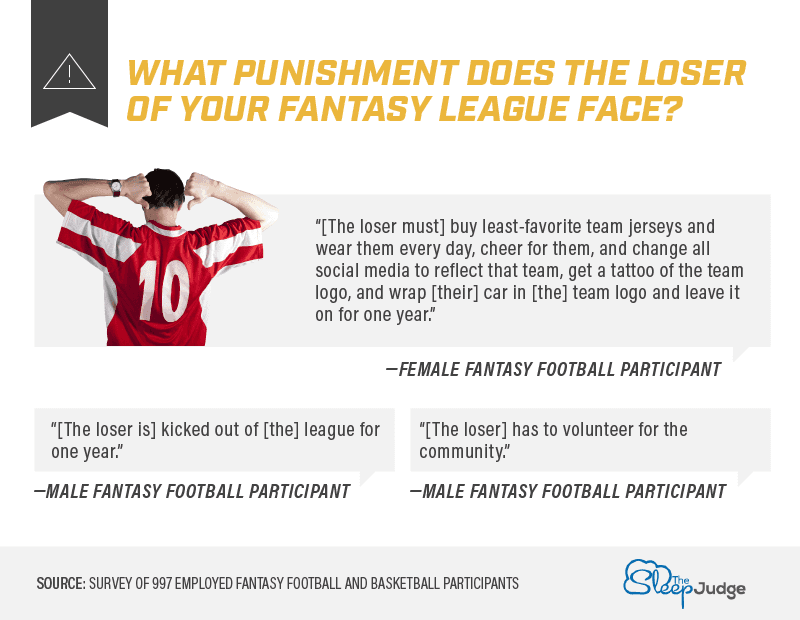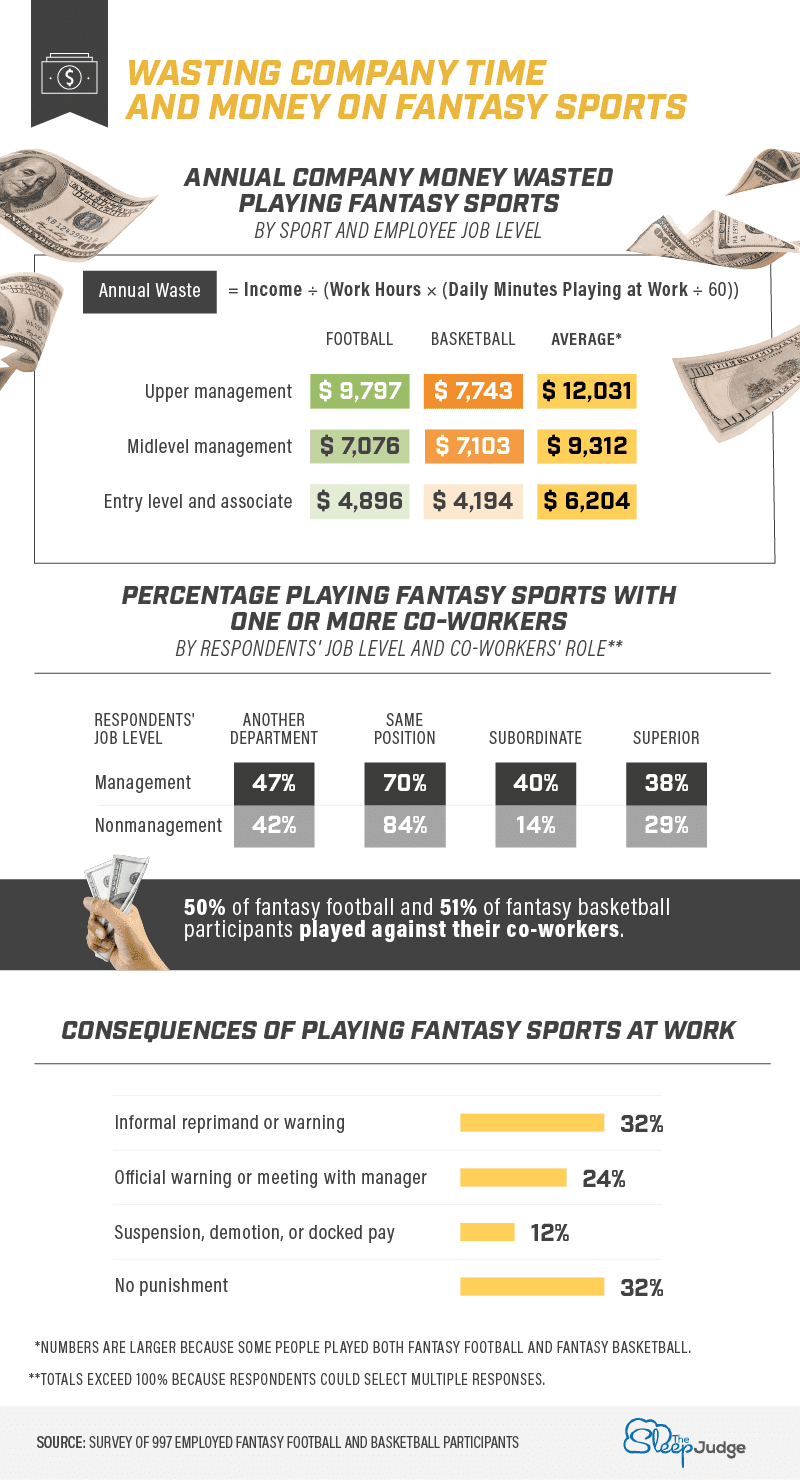The Fantasy Sports and Gaming Association claims that it represents the interests of more than 60 million people in North America. And, according to Fox Business, the industry is worth $7 billion.
So, how do fantasy sports fit into the average person’s life? We surveyed nearly 1,000 employed people with fantasy football and basketball teams to find out. Read on to discover if Americans take time away from work and home to play fantasy sports.
Losing Sleep to Play
Forty-eight percent of football fans and 54% of basketball fans were more excited about their fantasy team winning than they were about their real-life favorite squad succeeding. While watching Tom Brady throw a winning touchdown pass may be thrilling, it doesn’t make fans money.
But setting Brady up in a fantasy league does. The average payout for a fantasy football victory was nearly $500 – and around $300 for basketball. But do people lose sleep to play? The majority of people in our study stayed up late to play fantasy sports during the workweek, and they played an average of 2.3 nights per week.
Fantasy sports have long been considered a game of skill, with those extremely devoted to their teams committing quite a lot of time. In fact, fantasy football participants who were extremely committed to the game spent around five hours a week with their eyes glued to the screen. However, compared to fantasy basketball participants, football commanded the attention of fantasy participants whatever their commitment to their league. Perhaps fantasy football participants make more, on average, because they spend more time playing fantasy and building their skills.
Performance at the Office
Although fantasy basketball participants spent fewer hours overall playing fantasy than football fans, they stayed up late almost an extra night a week. And for over 40% of survey participants, losing sleep meant enduring a small decrease in work productivity. For another third, staying up late was a recipe for a substantial decrease in productivity. Even 16 minutes of sleep loss can keep people distracted and off-task the next day.
However, sleep isn’t all people are giving up to prioritize fantasy sports: Employees, including people in management positions, said they take time away from their jobs to game. Thirty-nine percent of managers and 27% of those in nonmanagement positions said they’ve left work early to attend a fantasy draft. Others had long lunches, and some even took an entire day off for a shot at the perfect draft board, including over a quarter of managers.
Worse, perhaps, is the time spent playing fantasy sports on the clock. Respondents admitted to spending upwards of half an hour on an average workday playing, researching, or discussing fantasy sports—although those totals were liable to double, given the right incentives.
It’s clear that how much work time fantasy participants were willing to sacrifice for success was tied to an understandable system of incentives. While a large payout for the winner may seem sufficient motivation on its own, respondents who faced a punishment for placing last in their league admitted to dedicating a larger chunk of company time to fantasy success. With the threat of being kicked out of their league or adorn an enemy team’s uniform looming, it’s understandable that they’d have a vested interest in succeeding.
Gaming on the Boss’s Dime
Showing up to work late or taking a long lunch to draft a player might not seem like a big deal, but when employees decide to put on their fantasy caps on company time, the financial strain can be serious.
Fantasy football participants squandered the most money from their companies, with those in upper management positions wasting $9,797 worth of their employer’s money annually, on average. Fantasy basketball participants in midlevel management positions were responsible for the most significant profit loss at that job level, though – $7,103 annually. Meanwhile, entry-level employees and associates who played fantasy football on their boss’s dime cost companies $4,896 annually, on average.
Not only did employees game at work, but they also distracted others. A staggering 70% of managers and 84% of nonmanagers reported playing fantasy sports with co-workers who held the same position. It was widespread: Employees played across departments and with their superiors and subordinates. While 32% received no punishment or an informal reprimand, more than 1 in 10 fantasy sports participants said they received a suspension, demotion, or had been docked pay for gaming at work.
Game Over Everything
It’s one thing to steal a 30-minute block to play fantasy basketball at work, but do people’s social and familial responsibilities suffer as well?
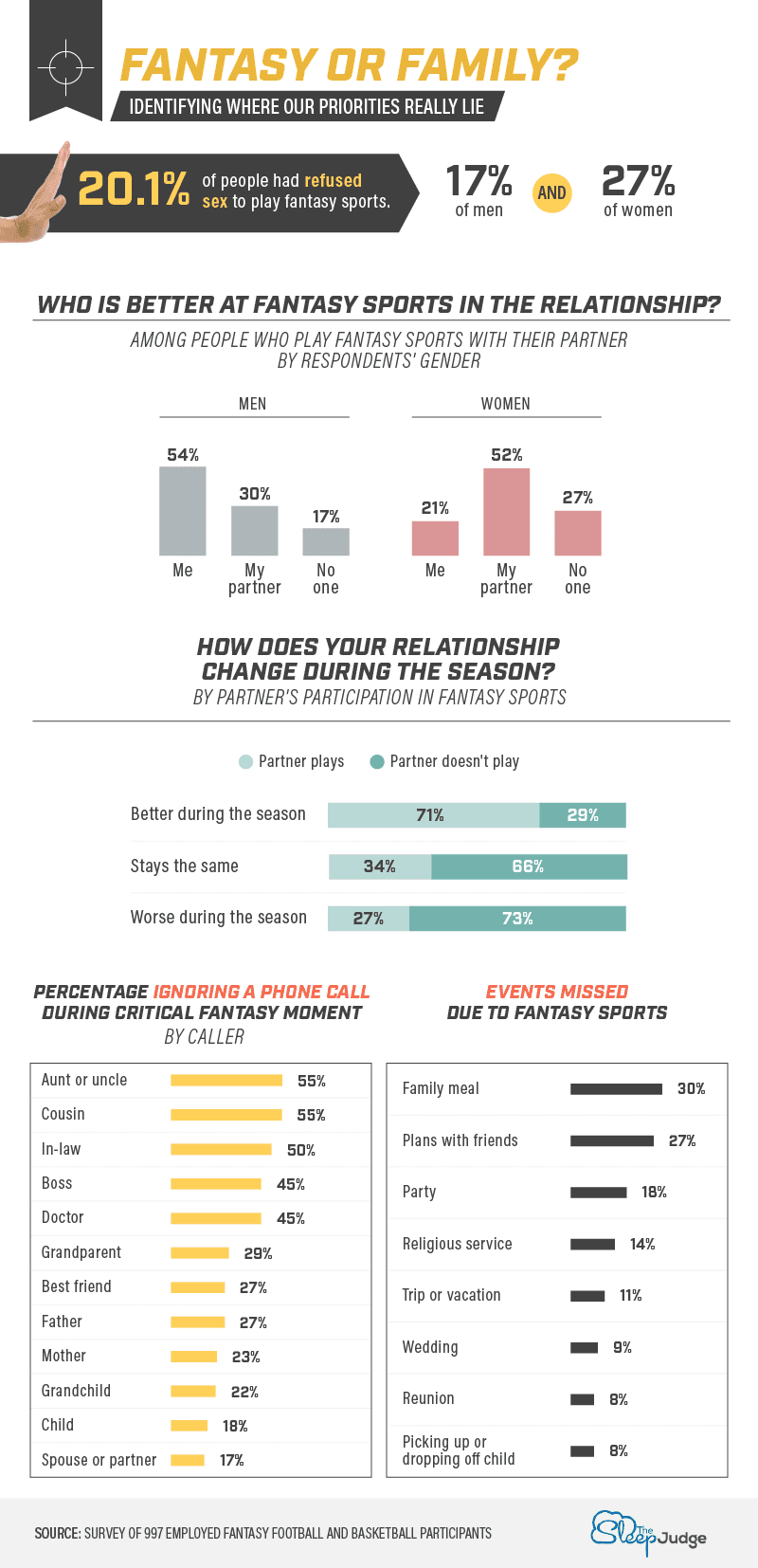
However, if partners jumped on the fantasy bandwagon, the relationship improved. More than 7 in 10 partners who shared a love of fantasy sports saw an improvement in their relationship during the season. Although romantic partners don’t need to have the same hobbies and interests, drafting together has an advantage: Of those whose partners didn’t play with them, 73% said their relationship worsened during the fantasy season.
Fantasy Is Here for the Long Haul
Fantasy gaming has been around since the pen and paper days, and it seems important to those who play. According to our findings, people took fantasy leagues seriously enough that they lost sleep and called out of work. Familial relationships also suffered, but those who joined forces with their partners tended to enjoy improved relationships during the fantasy season.
Getting enough sleep may help you improve your gaming, too. Visit TheSleepJudge.com to find the best mattresses and sleep products so that you’re always game-ready. Our team reads online reviews and tests mattresses for durability, load deflection, heat transfer, and other factors to ensure that you won’t lose any sleep during the season.
Methodology
We surveyed 997 employed people who play fantasy football, basketball, or both on their fantasy sports habits, with aims to see how their participation affects their productivity at work and relationships at home. Thirty-one percent of respondents were female, and 69% were male. 8.7% played only fantasy basketball, 60.6% played only fantasy football, and the remaining 30.7% played both. For numerical responses, values outside the range of three standard deviations above and below the mean were deemed outliers and excluded from the responses.
Limitations
Survey-based data are always subject to certain restrictions, as responses rely on self-reported information by respondents. The data were not weighted, and outside of the removal of outliers, no statistical testing was undertaken.
Fair Use Statement
Are you, your partner, or too many of your employees fantasy fanatics? The graphics and information found on this website are available for noncommercial reuse. We encourage you to share them as much as you’d like across the web, on social media, and at the office, but please make sure to link back to this page. Thank you!

